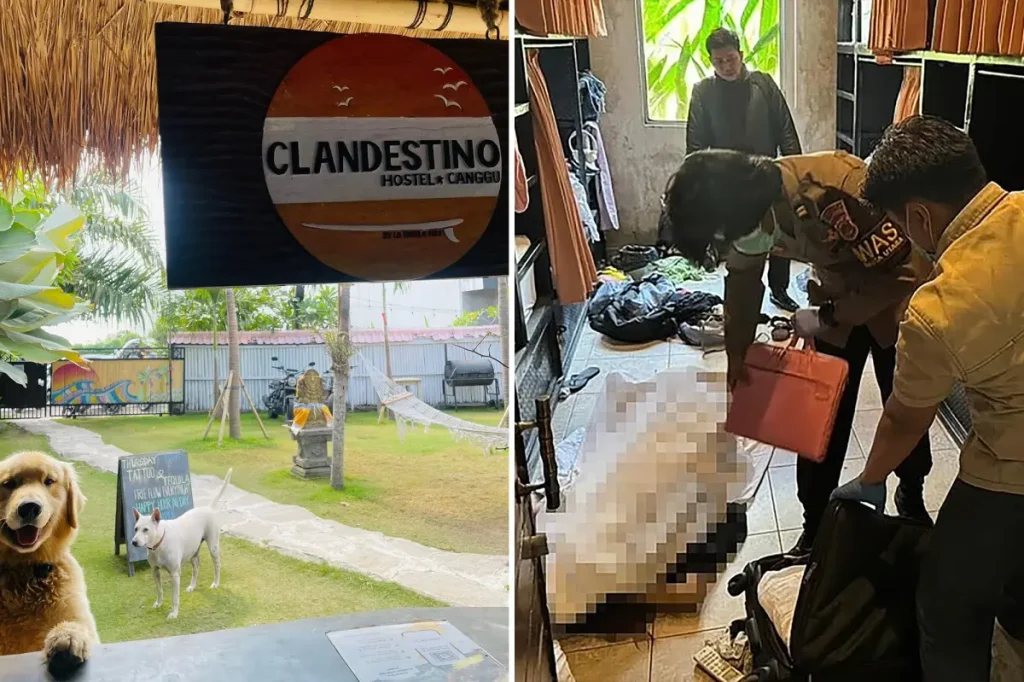The Deadly Mysteries of Paradise: Understanding the Bali Hostel Tragedy
What was meant to be a dream vacation in Bali’s tropical paradise turned into a nightmare for 25-year-old Chinese tourist Deqing Zhuoga and approximately twenty other guests at the Clandestino Hostel in Canggu. In September, these travelers experienced a horrifying mass illness with symptoms including vomiting, diarrhea, chills, and shortness of breath. The situation quickly escalated from concerning to catastrophic when Zhuoga was found dead in her room on September 2, surrounded by vomit and wearing only an unbuttoned blue shirt. Around ten other travelers required intensive care, including Zhuoga’s friend Leila Li, who fought for her life over five days. This tragic incident has sparked intense investigation and raised alarming questions about safety standards in budget accommodations popular with international travelers. The circumstances surrounding this case have puzzled medical experts and highlighted the potential dangers lurking in seemingly innocent vacation settings.
The investigation has uncovered two primary theories about the cause of this mass poisoning. The first centers on possible pesticide exposure, as the hostel had reportedly been fumigated for bed bugs shortly before the incident. According to Li, who survived after intensive medical treatment, the room adjacent to where she and Zhuoga stayed had been sealed off after being sprayed the day before their symptoms began. Li stated that doctors diagnosed her with both pesticide and food poisoning during her hospital stay. This theory gained further credibility given the timing of the fumigation and the rapid onset of symptoms among multiple guests. The second theory involves the communal dinner shared by many of the affected guests the evening before Zhuoga was discovered. The proximity of the meal to the onset of symptoms has raised questions about whether contaminated food might have played a role in this tragic event. Medical experts consulted by news outlets have suggested that either explanation—or possibly a combination of both—could account for the mass poisoning.
Dr. Dicky Budiman, a respected global health expert and epidemiologist who reviewed the case, explained that both scenarios are medically plausible. “There are two possibilities that need to be examined here,” he told news.com.au. “Mass food poisoning after eating together, or the potential for a mass poisoning from insecticide or fumigation. Or it could be a combination of both.” He elaborated that insecticide poisoning would be consistent with the reported fumigation activities, but the timing of symptom onset shortly after the communal dinner also supports food poisoning as a potential culprit. Dr. Budiman emphasized that improper fumigation techniques, such as inadequate ventilation or fumigating areas near occupied rooms, could create dangerous conditions. Additionally, if insecticides contaminated food or food preparation surfaces, this could create a particularly hazardous situation where both exposure routes were simultaneously present. The complexity of the case underscores the need for what Dr. Budiman described as “a thorough and comprehensive investigation into what happened.”
Medical specialists acknowledge the difficulty in definitively identifying the exact cause without specific toxicology testing. Dr. Ryki Sihombing, an internal medicine doctor at Siloam Hospital in Medan, Indonesia, confirmed that based on symptoms alone, it would be “very difficult” to determine whether insecticide exposure, food contamination, or both were responsible. While acknowledging that high-dose insecticide exposure from bed bug fumigation could potentially cause toxicity, Dr. Sihombing noted he had never personally encountered such a case in his practice. The treatment approach would require knowing precisely what toxin was involved, as different poisons require specific antidotes. He advised that travelers who suspect poisoning should try to bring samples of suspected contaminated materials to hospitals for testing, which would enable medical staff to administer appropriate treatments. This recommendation highlights the challenges in treating poisoning cases, particularly in tourist settings where communication barriers and unfamiliarity with local healthcare systems can complicate prompt and effective treatment.
Despite the shocking nature of this incident, pest control professionals expressed skepticism about fumigation as the sole cause of death. Yusri, who operates Antira Pest Control in Medan, stated emphatically, “I have sprayed thousands of homes and no one has died.” However, he raised important concerns about unregulated practices in the industry. Some establishments might use unbranded, homemade, or budget insecticides with unknown ingredients rather than approved commercial products. Yusri emphasized that proper fumigation requires thorough training, appropriate ventilation procedures, and complete evacuation of all occupants during treatment. All bedding should be washed after fumigation to eliminate residual chemicals. He offered a simple warning sign for travelers: “If you are in a hotel and you can smell insecticide or chemicals, it means that it is not safe to be there.” These insights suggest that while properly conducted pest control should not cause fatalities, corners cut on safety protocols could create deadly conditions, especially in budget accommodations where regulatory oversight may be limited.
Tragically, the Bali incident is not isolated. Similar cases have emerged in popular tourist destinations, establishing a disturbing pattern. In February, British influencer Ebony McIntosh, 24, and German tourist Nadine Raguse, 26, died at the Miracle Colombo City Hostel in Sri Lanka under circumstances suggesting pesticide poisoning after staying in a recently fumigated room. More recently, in November, a German family of four—the Boceks—died mysteriously while vacationing in Turkey, with initial investigations pointing to possible insecticide poisoning after hotel rooms were treated for bed bugs, potentially allowing chemicals to spread through ventilation systems. Dr. Budiman’s advice for travelers is unequivocal: if experiencing symptoms like vomiting, headaches, or breathing difficulties after potential chemical exposure, seek emergency medical care immediately and explicitly inform healthcare providers about any fumigation activities at your accommodation. He further advised travelers to question management about chemical smells or sealed rooms, ensure proper ventilation, and never sleep in recently fumigated spaces. These tragic cases collectively serve as a sobering reminder that paradise destinations can harbor hidden dangers, particularly when safety standards and regulations are inadequately enforced in the accommodations serving international travelers.


